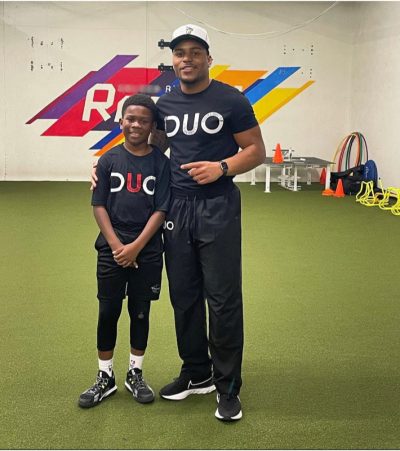The Importance of Mentorship in Sports
When we talk about mentorship in sports, it’s not just about teaching skills or strategies. It’s about shaping the mental, emotional, and personal growth of athletes. Mentoring is especially important for young athletes who may not fully grasp how challenging the journey can be, or how critical the guidance of a mentor is to getting through the ups and downs on and off the field.
As someone who is currently competing at a high level athlete, I’m still faced with setbacks. My experiences allow me to help athletes push through when things get tough. My understanding that success in sports isn’t just about being the best player—it’s about learning to overcome obstacles, staying focused on goals, and using sports as a springboard for future opportunities!
Meet the Athlete: Jahziah Braxton!

Mentorship Services
Navigating the Recruiting Process and Opportunities
One aspect of mentorship that’s often overlooked is the guidance on recruitment and navigating the high school, junior college, pop warner skills camps and university system. As a player, I have experienced of being apart of prep school, Division I, II and III programs. It gave me an understanding of how to present myself to coaches, making the most out of your college experience, and maximizing potential scholarship or professional opportunities.
Public Speaking & Interview Prep
Media interviews often involve questions designed to provoke a reaction or create controversy. My experience allows you to teach athletes emotional regulation—how to stay calm under pressure and respond thoughtfully. Athletes will be taught how to maintain their composure when the media scrutinizes them after a tough loss or personal mistake, and how to manage negative coverage without letting it derail their focus or self-confidence.
Regular Check-ins
Regular check-ins create a feedback loop, where athletes can share their struggles or successes. This ongoing dialogue helps athletes feel seen, heard, and supported throughout their journey, which is crucial for their overall development. Sometimes, athletes might hit a mental block or experience a lack of motivation. Whether it’s revisiting their long-term goals, discussing what drives them, or breaking things down into more manageable steps, mentoring can help them rediscover their focus and motivation.
Off-Field Guidance
As an athlete, there’s a lot more going on off the field than people realize. Academic pressures, mental health, and time management are just some of the challenges athletes face. Mentoring can help athletes develop life skills that they can carry with them beyond their sports career, and even help them transition to life after sports, which is an area often overlooked by both coaches and athletes.
Academic Accountability
Many athletes struggle to see the connection between their academic success and their athletic performance. By having regular discussions about both aspects of their lives, you can show them how performing well in school can create more opportunities in the future—whether it's eligibility for scholarships, more time for training, or the confidence that comes from excelling in multiple areas.
Encouragement and Positive Reinforcement
Athletes often associate mistakes, losses, or poor performances with failure. Mentoring can shift this perspective, teaching athletes that failures are opportunities to learn and grow. Giving an athlete clear, realistic goals to work toward. Celebrating even the smallest achievements along the way shows athletes that they’re making progress, which builds momentum!
